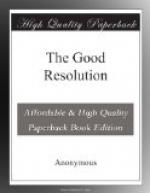My young readers, if any of you are conscious of having the same fault that Isabella determined to endeavor to correct, make with her now a resolution to pray, and strive against it, and go to your heavenly Father, and ask his assistance. Plead earnestly in the name of Christ for the gift of the Holy Spirit.
Mrs. Gardner heard with gratitude the determination of her child, and left her with an affectionate wish that her birth-day might pass happily. When Isabella returned to her chamber she found upon her table a large Bible. It was a birth-day gift from her parents, and beneath Isabella’s name were written the words which stand on the title-page of this book,—“He that is slow to anger is better than the mighty; and he that ruleth his spirit, than he that taketh a city.” Prov. xvi, 32.
Isabella had two brothers, Edward and George: they were both younger than herself. Mary, her only sister, was seventeen years old, and was a lovely example of gentleness and piety. She was not so quick as Isabella; but she had “the ornament of a meek and quiet spirit,” which is far more beautiful in the sight of God than the most brilliant worldly accomplishments. Her faults were controlled by Christian principle and self-denial; and an affectionate interest in the happiness of others marked her conduct.
On the morning of Isabella’s birthday, Mary was busily employed in arranging fresh flowers in the little parlor, and in trying to make everything look pleasant for her sister. The recollection of Isabella’s unkindness to her the day before, while it grieved her kind heart, only made her the more anxious to add to her happiness.
This was like many other summer days. Though it opened in sunshine, it closed in clouds. At about twelve o’clock the bright light was darkened, and soon the heavy rain began to fall.
“How cross Isabella will be this afternoon!” said Edward to his sister Mary. “I am sure I don’t want to see her; she will be so angry because it rains.”
“That is a very unkind remark, Edward,” replied Mary, “and shows a wrong state of feeling. I have not heard Isabella speak an angry word to-day; and instead of wishing to be out of her way, you ought to try to do all that you can to make up to her for the disappointment she will feel at not seeing her young friends.”
“You are right, sister Mary,” said Edward: “in judging Isabella I was committing the same sin myself; and I thank you for correcting me. I will try to make my sister happy; but I do hope that as she grows older she will become more amiable, and do to others as she would have them do to her.”
At this moment Isabella entered the room. There was no blue sky to be seen, nor any prospect of fair weather.
“I am sorry that your friends will not be able to come this afternoon, Isabella,” said Mary; “but we will all try to make the evening of your birth-day pass pleasantly; and when our father comes home, I am sure he will read to us in any book you wish.”




